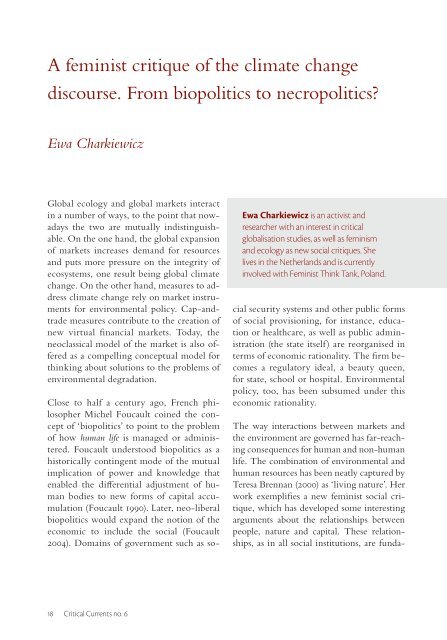Contours of Climate Justice - Dag Hammarskjöld Foundation
Contours of Climate Justice - Dag Hammarskjöld Foundation
Contours of Climate Justice - Dag Hammarskjöld Foundation
You also want an ePaper? Increase the reach of your titles
YUMPU automatically turns print PDFs into web optimized ePapers that Google loves.
A feminist critique <strong>of</strong> the climate change<br />
discourse. From biopolitics to necropolitics?<br />
Ewa Charkiewicz<br />
Global ecology and global markets interact<br />
in a number <strong>of</strong> ways, to the point that nowadays<br />
the two are mutually indistinguishable.<br />
On the one hand, the global expansion<br />
<strong>of</strong> markets increases demand for resources<br />
and puts more pressure on the integrity <strong>of</strong><br />
ecosystems, one result being global climate<br />
change. On the other hand, measures to address<br />
climate change rely on market instruments<br />
for environmental policy. Cap-andtrade<br />
measures contribute to the creation <strong>of</strong><br />
new virtual fi nancial markets. Today, the<br />
neoclassical model <strong>of</strong> the market is also <strong>of</strong>fered<br />
as a compelling conceptual model for<br />
thinking about solutions to the problems <strong>of</strong><br />
environmental degradation.<br />
Close to half a century ago, French philosopher<br />
Michel Foucault coined the concept<br />
<strong>of</strong> ‘biopolitics’ to point to the problem<br />
<strong>of</strong> how human life is managed or administered.<br />
Foucault understood biopolitics as a<br />
historically contingent mode <strong>of</strong> the mutual<br />
implication <strong>of</strong> power and knowledge that<br />
enabled the diff erential adjustment <strong>of</strong> human<br />
bodies to new forms <strong>of</strong> capital accumulation<br />
(Foucault 1990). Later, neo-liberal<br />
biopolitics would expand the notion <strong>of</strong> the<br />
economic to include the social (Foucault<br />
2004). Domains <strong>of</strong> government such as so-<br />
18 Critical Currents no. 6<br />
Ewa Charkiewicz is an activist and<br />
researcher with an interest in critical<br />
globalisation studies, as well as feminism<br />
and ecology as new social critiques. She<br />
lives in the Netherlands and is currently<br />
involved with Feminist Th ink Tank, Poland.<br />
cial security systems and other public forms<br />
<strong>of</strong> social provisioning, for instance, education<br />
or healthcare, as well as public administration<br />
(the state itself) are reorganised in<br />
terms <strong>of</strong> economic rationality. The fi rm becomes<br />
a regulatory ideal, a beauty queen,<br />
for state, school or hospital. Environmental<br />
policy, too, has been subsumed under this<br />
economic rationality.<br />
The way interactions between markets and<br />
the environment are governed has far-reaching<br />
consequences for human and non-human<br />
life. The combination <strong>of</strong> environmental and<br />
human resources has been neatly captured by<br />
Teresa Brennan (2000) as ‘living nature’. Her<br />
work exemplifi es a new feminist social critique,<br />
which has developed some interesting<br />
arguments about the relationships between<br />
people, nature and capital. These relationships,<br />
as in all social institutions, are funda-
















